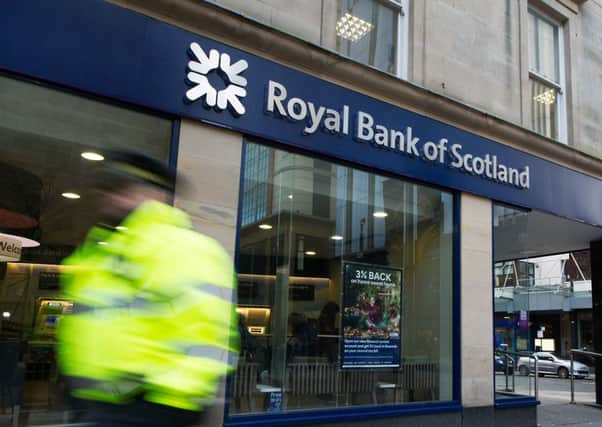Royal Bank of Scotland posts first profit since 2015
This article contains affiliate links. We may earn a small commission on items purchased through this article, but that does not affect our editorial judgement.


The taxpayer-owned lender booked a £259 million profit in the first three months of the year, compared with a £968m loss in the same quarter last year.
It is the first time since the third quarter of 2015 that Edinburgh-based RBS, which is 72 per cent owned by the UK government, has turned a quarterly profit.
Advertisement
Hide AdAdvertisement
Hide Ad• READ MORE: RBS announces 30 branch closures across Scotland
The numbers will come as welcome relief to chief executive Ross McEwan, who has presided over a string of recent poor results, which tally up to a staggering £58 billion of losses since RBS was bailed out by the government at the height of the financial crisis.
McEwan said: “These results reflect very much what we talked about at full year.
“This bank has a very strong core with great potential, and we believe that, by going further on cost reduction and faster on digital transformation, we will deliver a simpler, safer and even more customer-focused bank, with a compelling investment case.”
Advertisement
Hide AdAdvertisement
Hide AdThe core bank’s adjusted operating profit also rose in the quarter, from £303m to £1.3bn. Today’s figures also show that RBS booked £577m in restructuring costs.
Today’s first-quarter results come the day after RBS said it had moved a step closer to reaching a settlement with all five shareholder groups that brought compensation claims against it in connection with its 2008 rights issue.
The bank said it had reached a “full and final settlement” with a further 9 per cent of total claimants, which represent part of the fifth and final shareholder group that has yet to resolve the dispute. Those claimants are estimated to have received about £80m of the £800m pot that was put aside by the bank to cover the claims.
Advertisement
Hide AdAdvertisement
Hide AdRBS, which reached settlements with four of the shareholder groups in December 2016, stressed it made the payments “without any admission of liability”.
But the bank is not out of the woods yet, and could now face a parliamentary inquiry into spiralling legal costs – set to hit £125m – used to defend itself, disgraced former boss Fred Goodwin and three former directors in the rights issue case.
Members of the the RBS Shareholder Action Group who have not reached a settlement with the bank will be taking their case to trial next month, in what is becoming one of the most costly civil defences in British history.
The legal action is linked to a rights issue overseen by Goodwin. In April 2008, RBS asked existing shareholders to inject £12bn into the firm to strengthen its reserves after it had spent £49bn to acquire Dutch bank ABN Amro.
Advertisement
Hide AdAdvertisement
Hide AdThe deal proved toxic and, just months later, the value of RBS shares plunged 90 per cent and the government had to step in.
In February, RBS reported a £7bn annual loss and McEwan ordered a £2bn four-year cost-cutting drive, expected to result in significant job losses and branch closures. To this end, the bank took £278m in costs out of the business in the period.
Last week, Chancellor Philip Hammond made the stark admission that the government is prepared to sell its stake at a loss to the public purse.
The government bought its stake in the bank for £45bn in 2008, at 502p a share, as part of a bailout at the height of the financial crisis. But shares in the troubled lender are now trading at around half that price.
Advertisement
Hide AdAdvertisement
Hide AdIt is understood that only once RBS’s legacy issues – such as fines in the US and state aid obligations – are dealt with, will the government begin selling down the taxpayers’ stake.
Meanwhile, Barclays cheered a strong start to the new year, with profits more than doubling in the first quarter as it edged closer to the end of a major restructuring programme.
• READ MORE: Barclays tops table for financial service complaints
The lender said group pre-tax profit surged to £1.68bn in the three months to the end of March, up from £793m in the same period last year.
Advertisement
Hide AdAdvertisement
Hide AdChief executive Jes Staley, who has been offloading unwanted businesses to focus on UK and US operations, said the bank has nearly completed its overhaul.
“This has been another quarter of strong progress towards the completion of the restructuring of Barclays. Group profit before tax more than doubled compared to Q1 of 2016, and our core businesses continued to perform very well.”
He added: “We are now just two months away from completing the restructuring of Barclays as a transatlantic consumer, corporate and investment bank, and there is further good reason in this quarter’s performance to feel optimistic for our prospects.”